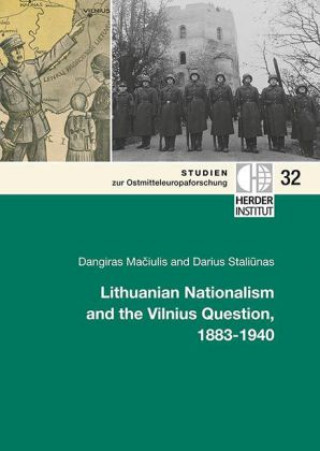
Kód: 09507887
Lithuanian Nationalism and the Vilnius Question, 1883-1940
Autor Dangiras Maciulis, Darius Staliunas
According to the 1897 general census of the Russian Empire, the percentage of Lithuanians in the city of Vilnius stood only at 2.1 per cent. At the same time, Lithuanian activists also had no allies in their struggle for the creat ... celý popis
- Jazyk:
 Angličtina
Angličtina - Vazba: Brožovaná
- Počet stran: 236
Nakladatelství: Verlag Herder-Institut, 2015
- Více informací o knize

Mohlo by se vám také líbit
-

MARKET LEADER PRE-INTERMEDIATE BUSINESS ENGLISH COURSE BOOK+CD
1255 Kč -

Literary Varieties
831 Kč -

Put the Billy On
500 Kč -

TREASURY OF SCALES 3RD CL
221 Kč -

Ornamental Horticulture
3649 Kč -

Roman and medieval revetments on the Thames waterfront
550 Kč -

Code of Federal Regulations, Title 12: Parts 1-199 (Banks and Banking) Comptroller of the Currency: Revised 1/09
1421 Kč
Darujte tuto knihu ještě dnes
- Objednejte knihu a zvolte Zaslat jako dárek.
- Obratem obdržíte darovací poukaz na knihu, který můžete ihned předat obdarovanému.
- Knihu zašleme na adresu obdarovaného, o nic se nestaráte.
Více informací o knize Lithuanian Nationalism and the Vilnius Question, 1883-1940
Nákupem získáte 108 bodů
 Anotace knihy
Anotace knihy
According to the 1897 general census of the Russian Empire, the percentage of Lithuanians in the city of Vilnius stood only at 2.1 per cent. At the same time, Lithuanian activists also had no allies in their struggle for the creation both of territorial autonomy first and later of an independent state "within its ethnographic boundaries" with Vilnius as its capital. Yet, irrespective of all these circumstances, the majority of the leaders of the Lithuanian national movement saw Vilnius as their future capital. This book explores the emergence of the notion of Vilnius as the capital of modern Lithuania, which was nurtured in the late 19th and early of the 20th century, as well as examining its evolution and implementation among the masses. Since the nationalists of the time found it hard to imagine a national state with a capital in which the titular nation makes up no more than a few percent of its citizens, Lithuanisation of Vilnius, i.e. the aim that the majority of the city's inhabitants be Lithuanians, is also among the topics discussed in this study. A great part of the book is devoted to the interwar period when Vilnius was part of Poland, and the Lithuanian political and intellectual elite tried to instill the idea of Vilnius as an eternal capital of Lithuania into the masses. This study shows that in interwar Lithuania, the idea of Vilnius as the capital of modern Lithuania became not only a political ideal but also a tool for political manipulation. While this book does not analyse in detail the attitudes held by Jews, Poles, Belarusians or Russians regarding the Vilnius question, it nevertheless points out the counter-arguments of other Nationalities the Lithuanian claims to Vilnius were up against.§§Der 1897 im Russischen Reich durchgeführte Zensus bezifferte den litauischen Anteil der Bevölkerung von Vilnius auf lediglich 2,1 Prozent. Gleichzeitig verfügte die litauische Nationalbewegung über keinerlei Verbündete in ihrem Kampf, der zunächst auf die Herstellung territorialer Autonomie, später dann auf die Errichtung eines unabhängigen Staates "in seinen ethnographischen Grenzen" mit Vilnius als Hauptstadt abzielte. Trotz dieser ungünstigen Umstände sahen ihre zentralen Akteure Vilnius als zukünftige litauische Hauptstadt an. Das vorliegende Buch untersucht das Zustandekommen dieses Ansinnens, das im späten 19. und frühen 20. Jahrhundert aufkam, und fragt nach seiner Entwicklung und Implementierung. Da für die Nationalbewegung eine Hauptstadt schwer vorstellbar war, in der die Titularnation lediglich wenige Prozent ihrer Bevölkerung ausmachte, liegt ein weiterer Fokus der Studie auf die für nötig erachtete Litauinisierung Vilnius'. Ein großer Teil des Buches befasst sich mit der Zwischenkriegszeit, in der Vilnius zu Polen gehörte, und in der die litauische politische und kulturelle Elite Anstrengungen unternahm, die Idee von Vilnius als ewiger Hauptstadt Litauens in die breite Bevölkerung zu tragen. In dieser Periode, so ein Ergebnis der Studie, wurde Vilnius nicht nur zu einer politischen Idee, sondern entwickelte sich gleichzeitig zu einem Werkzeug politischer Manipulation. Auch die Ansprüche anderer Nationalitäten, die beispielsweise von Juden, Polen und (Weiß-)Russen vorgebracht wurden und denen sich die litauische Nationalbewegung gegenübersah, werden skizziert.
 Parametry knihy
Parametry knihy
1084 Kč
- Plný název: Lithuanian Nationalism and the Vilnius Question, 1883-1940
- Autor: Dangiras Maciulis, Darius Staliunas
- Jazyk:
 Angličtina
Angličtina - Vazba: Brožovaná
- Počet stran: 236
- EAN: 9783879694013
- ID: 09507887
- Nakladatelství: Verlag Herder-Institut
- Hmotnost: 418 g
- Rozměry: 240 × 170 × 14 mm
- Rok vydání: 2015
Oblíbené z jiného soudku
-

Dune
216 Kč -

Haunting Adeline
621 Kč -

Berserk Deluxe Volume 2
1092 Kč -

White Nights
89 Kč -

Powerless
268 Kč -

Atomic Habits
330 Kč -

Dune Messiah
228 Kč -

Berserk Deluxe Volume 3
1142 Kč -

One Day
221 Kč -

Berserk Deluxe Volume 1
1115 Kč -

Iron Flame
368 Kč -

Surrounded by Idiots
213 Kč -

Harry Potter and the Prisoner of Azkaban (Minalima Edition)
993 Kč -

Gravity Falls Journal 3
443 Kč -

Heaven Official's Blessing: Tian Guan Ci Fu (Novel) Vol. 1
440 Kč -

The Creative Act
568 Kč -

Dune
276 Kč -

Hunting Adeline
624 Kč -

A Little Life
290 Kč -

Children of Dune
230 Kč -

Heaven Official's Blessing: Tian Guan Ci Fu (Novel) Vol. 2
427 Kč -

Bungo Stray Dogs, Vol. 8 (light novel)
383 Kč -

Percy Jackson and the Olympians 5 Book Paperback Boxed Set
944 Kč -

Solo Leveling, Vol. 1
440 Kč -

The Prisoner's Throne
247 Kč -

Court of Thorns and Roses
268 Kč -

Cry Baby Coloring Book
276 Kč -

Fourth Wing
407 Kč -

Icebreaker
199 Kč -

Berserk Deluxe Volume 6
1089 Kč -

Avatar, the Last Airbender: The Kyoshi Novels (Box Set)
986 Kč -

The 48 Laws of Power
601 Kč -

House of Leaves
611 Kč -

Twisted Lies
213 Kč -

Dune Messiah
272 Kč -

No Longer Human
359 Kč -

48 Laws Of Power
331 Kč -

Twisted Games
213 Kč -

Caraval Paperback Boxed Set
902 Kč -

Solo Leveling, Vol. 2
468 Kč -

Open Circuits
907 Kč -

Berserk Deluxe Volume 5
1119 Kč -

Heaven Official's Blessing: Tian Guan Ci Fu (Novel) Vol. 3
476 Kč -

Berserk Deluxe Volume 4
1125 Kč -

Court of Mist and Fury
206 Kč -

SOLO LEVELING V08
436 Kč -

English File Upper Intermediate Multipack A (4th)
531 Kč -

CHAINSAW MAN V14
251 Kč -

Before the Coffee Gets Cold
184 Kč
Osobní odběr Praha, Brno a 12903 dalších
Copyright ©2008-24 nejlevnejsi-knihy.cz Všechna práva vyhrazenaSoukromíCookies



 Vrácení do měsíce
Vrácení do měsíce 571 999 099 (8-15.30h)
571 999 099 (8-15.30h)